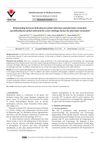
Search
for
Sort by
Research
330-360 / 1000+ results

research The Use of Platelet-Rich Plasma in the Treatment of Alopecia - A Review of the Literature
Platelet-Rich Plasma therapy helps increase hair density and regrowth for some types of hair loss.
research Comprehensive Review of Tinea Capitis in Adults: Epidemiology, Risk Factors, Clinical Presentations, and Management
Tinea capitis in adults, especially postmenopausal Black women, needs prompt treatment with oral antifungals to avoid scarring.

research Systematic Review of Platelet-Rich Plasma Use in Androgenetic Alopecia Compared with Minoxidil, Finasteride, and Adult Stem Cell-Based Therapy
PRP injections may be a safe, effective alternative for hair loss treatment compared to minoxidil and finasteride.

research Cutaneous Adverse Drug Reactions to Antibiotics: Extent of the Problem
Antibiotics often cause skin reactions, making them a major health concern.
research An 85-Year-Old Man With Recurrent Fever and Multiple Splenic Infarcts
Travel history and tick-borne diseases should be considered in unexplained fevers for timely diagnosis and treatment.

research Safety Concerns When Using Novel Medications to Treat Alopecia
Consider benefits and risks of new alopecia treatments for safety.

research Dermatological Adverse Events with Taxane Chemotherapy
Taxane chemotherapy can cause skin, hair, and nail side effects, which are often under-reported and can affect patient quality of life.

research Multiple Sclerosis Disease-Modifying Therapies: Adverse Effect Surveillance and Management
The document concludes that managing side effects of MS therapies is crucial for treatment success and patient adherence.

research Efficacy and Safety of the Oral Janus Kinase Inhibitor Baricitinib in the Treatment of Adults with Alopecia Areata: Phase 2 Results from a Randomized Controlled Study
Baricitinib is effective and safe for treating severe alopecia areata.

research Flares of Systemic Lupus Erythematosus During Pregnancy and the Puerperium: Prevention, Diagnosis, and Management
Pregnancy can increase lupus activity, but careful planning and treatment can improve outcomes.

research Computational Screening of Repurposed Drugs and Natural Products Against SARS-CoV-2 Main Protease as Potential COVID-19 Therapies
Some existing drugs and natural products might work against COVID-19 by targeting the virus's main protease.

research Skin Signs of Systemic Diseases
Looking at skin can help find and treat serious diseases early.

research Retinoids for Chemoprophylaxis of Nonmelanoma Skin Cancer
Retinoids can prevent skin cancer in high-risk people but have side effects and require more research on dosing and effectiveness.

research Overview of Common, Rare, and Atypical Manifestations of Cutaneous Lupus Erythematosus and Histopathological Correlates
The document concludes that recognizing and treating cutaneous lupus erythematosus early is crucial for managing the skin and potential systemic symptoms.

research Immunization and Bacterial Pathogens in the Oropharynx as Risk Factors for Alopecia Areata
Immunization and throat bacteria may increase the risk of a hair loss condition called alopecia areata.

research Gender Aspects in Skin Diseases
Men are more likely to get infectious skin diseases, while women are more prone to autoimmune and pigment-related skin conditions, influenced by biological and environmental factors.

research Dysregulation of the Immune System in a Natural History Study of 1299 Individuals with Down Syndrome
People with Down syndrome have higher rates of certain immune-related conditions and need special medical attention.

research Gender Differences in Skin: A Review of the Literature
Male and female skin differ due to hormones, affecting conditions like hair loss, acne, and skin cancer, and suggesting a need for gender-specific treatments.

research Signal Transducer and Activator of Transcription 5B Deficiency Due to a Novel Missense Mutation in the Coiled-Coil Domain
A boy's growth and immune problems were caused by a new mutation in the STAT5B gene.

research Pathological Sequelae of Long-Haul COVID
Long-haul COVID can cause lasting symptoms affecting many body systems and may be linked to ongoing inflammation and immune system issues.
research Case of Alemtuzumab-Related Alopecia Areata Management in Multiple Sclerosis
Systemic corticosteroids might help treat hair loss caused by alemtuzumab in MS patients.

research The Evaluation of IL-4 Intron 3 VNTR and TNF-α (rs1799964) Gene Polymorphisms in Egyptian Patients with Alopecia Areata: A Case-Control Study
These specific gene polymorphisms are not linked to Alopecia Areata in Egyptians.

research Disease Versus Disease: How One Disease May Ameliorate Another
Some diseases can improve the outcomes of other diseases, leading to new treatment possibilities.

research Epidemiology, Management, and the Associated Burden of Mental Health Illness, Atopic and Autoimmune Conditions, and Common Infections in Alopecia Areata: Protocol for an Observational Study Series
People with alopecia areata have higher rates of mental health issues, autoimmune diseases, and infections.

research Relationship Between Helicobacter Pylori Infection and Pityriasis Versicolor: Can Helicobacter Pylori Infection Be a New Etiologic Factor for Pityriasis Versicolor?
There may be a link between Helicobacter pylori infection and the skin condition pityriasis versicolor.

research The Phenotype of Circulating Follicular-Helper T Cells in Patients with Rheumatoid Arthritis Defines CD200 as a Potential Therapeutic Target
Targeting CD200 could be a new treatment for rheumatoid arthritis.
research A Review of Adverse Cutaneous Drug Reactions Resulting from the Use of Interferon and Ribavirin
Interferon and ribavirin can cause serious skin reactions and other health issues.
research Cure of Alopecia Areata After Eradication of Helicobacter Pylori: A New Association?
Treating H. pylori infection might help cure alopecia areata.

research Cannabinoids: Current and Future Options to Treat Chronic and Chemotherapy-Induced Neuropathic Pain
Cannabinoids may help treat chronic and chemotherapy-induced neuropathic pain, but more research is needed to confirm their effectiveness and safety.